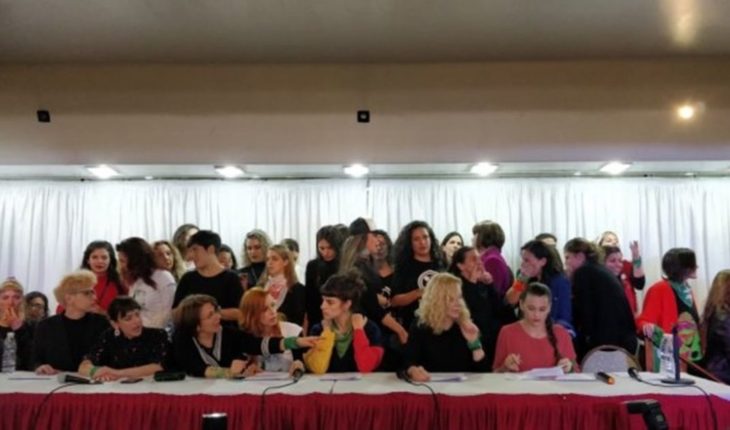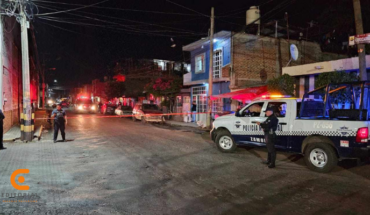The collective of Actrices Argentinas accompanied the complaint against the former director of the Centro Cultural San Martín together with different organizations of culture and human rights.Through a press conference, Laura Azcurra, Thelma Fardín, Cecilia Roth, Jazmin Stuart, Juliet Diaz among others read a statement pointing to abuse of power and job precarization. Here is the full communiqué: Us, Us and Nosotres:Actrices Argentinas, ABOFEM (Association of Feminist Lawyers), RAF (Network of Feminist Lawyers), Collective Authors, MUCABA (Musiques Unides en CABA), MUTO (Western Transfeminist Musiques), Fieras, Women Audiovisual (MUA), Students of Multimedia Arts of UNA and Dancers by Legalization.
With the adhesion of:
Neither One Less / National Campaign for the Right to Safe and Free Legal Abortion CABA / Mothers Victims of Trafficking / Permanent Assembly for Human Rights / Writers Argentinas / Usotras We Propose Literature / We Propose Visuals / FAI (Feminism International Anti-Specist) / Collective of Film and Advertising Techniques / Live Graphic Campaign we love / Worker Women of Comdono Py / Political Scene / Dance Forum in Action / Abolitionist Network Susi Betker / Butterflies Boom- urban action of gender / Week: it’s NOT + TRATA / National Anti-Trafficking Campaign and the Prostitution System / Her (Women of Communication) / Organised Music / SEA Signs in Action / Actresses of the region Viedma Patagones / Actresses Neuquén / Actrices Catamarqueñas / Sanga / EDA Argentine Association of Audiovisual Editors / Argentine Journalists / SAE Argentine Society of Editors / Shaking Voices / Maquilladoras (maqui/peini unit) / Network of Feminist Psychologues / Musandinas / Ojo Obrero / Plenary of workers / Commission for the Freedom of Marcos Bazán / Let’s Act grouping of artists sceniques / Muma Bariloche / Cultural Advocacy Gender Commission / Observatory of Gender Violence “Now That If They See Us” / Artists of the St. Louis/ Women movement and The Cinema / Comedias feminists / feminist actresses Córdoba / MITAD (Women in Technological, Audiovisual and Digital Industries) / ARTAS Feminist Collective of Performing Arts Rosario / Anti-fascist Movement LGBTIQ+ / Collective of Chaqueñas artists / Performative Group Butterflies of Santiago del Estero / Actresses Misiones / Erices Neuquén / DOCA (Documentaryoflers of Argentina)… We come together today to massively see an outspread reality in all academic and labour fields: gender-based violence and systematic harassment, exercised from the abuse of power. We accompany in this act the criminal denunciation of Anahí de la Fuente, who suffered harassment and abuse within the Centro Cultural San Martín by a manager who, in turn, is responsible for a chair within the UNA, National University of the Arts.
We also accompany all those who day by day suffer gender-based violence in their respective jobs and universities and who have not yet been able to raise their voice.
We completely repudiate the fact that a subject who engages in this type of violence occupies hierarchical positions in spaces that bring together culture, education and the state. And we’re here to say enough.
In a country where work is increasingly inaccessible and precarious, we cannot ignore the voices of those who, because of the urgent need to retain a job, must endure sexual harassment and the violation of their fundamental rights day after day.
Bosses who believe they own the bodies of their employees, groping them, making comments about their physical appearance and clothing, hinting at, chasing and punishing them the slightest hint of rejection, with screams and jobs outside the scheduled hours. Treating them as incapable, downgraded, by their gender, to perform unrelated tasks and publicly humiliating them in case they do not comply with their sexist and self-established rules.
These people also generate persecutory climates and job-to-work in the areas they lead, fostering the silence and fear of those who witness these abusive acts.
When the victim decides to speak, they threaten her covertly or directly. When the victim decides to report, she is left out of work like our partner Anahí.
Faced with the possibility that some other employee is a witness and decides to accompany the victim, they use different methods of extortion; with obvious practices like: unexpected pay rises in an obvious attempt to buy his silence. If they don’t accept the deal, they’re also a threat to leave them unemployed.
No more cover-up, no more naturalizing violence, no more friendeness who place aggressors in spaces of power, and definitely stop silencing victims through intimidating acts and threats.
Most of the time, this operation is facilitated by a means of contracting garbage, supported by the State, which does not ensure the protection of the basic rights of workers.
The harassed person, in addition to enduring the trauma of having been swept away by the brazenness of his superior, is displaced from his source of income and his space of belonging, while the aggressor retains his post, protected by the impunity of those who granted him his Privileges.
It is well known that this is not limited to the workplace alone. In the academic field, there are teachers who harass students. With inappropriate physical feedback and approaches, subjecting them to harassment, and putting their performance as students and futures professionals at stake.
This is not limited to this case, it is a systematic practice that we will not tolerate any more.
In parallel, the judicial system remains indifferent to the accounts of the assaulted persons, putting them on the bench of the accused, and revictimizing them, with evidence standards that do not adapt to this type of crime.
Most of the time, cases are archived and dismissed. Or when they go to trial, they take months – some years – until they are executed, while the victims continue to suffer the aftermath of ill-treatment and unemployment.
Against all this, we require a criterion of selection of people trained with a gender perspective for all those roles of power and decision within all spaces dependent on the State. For this, the accession and application of the Micaela Law is essential.
We raise this in the hope that this criterion will be extended to any public sphere, and also to the private. Because we know that this happens in any workspace: shops, offices, factories, etc.
The system must be reinvented at the root to ensure a fair and healthy working climate. Work should dignify, not humiliate.
A gender protocol should be applied in each private or public sphere and should be respected by each person who integrates those spaces.
As stipulated in the United Nations Declaration on the Elimination of Violence against Women, “States must implement by all appropriate means and without delay a policy aimed at eliminating violence against women. Violence against women shall be understood to cover physical, sexual and psychological violence perpetrated or tolerated by the State, wherever it occurs.”
We assume that this statement also applies to all dissents. We demand to eliminate job precarization and junk hires, which leave employers vulnerable to abuse, harassment and abuse. This is part of a system that attacks people’s physical and emotional integrity.
We urgently demand the reinstatement of the workers of the San Martín Cultural Center who were removed from their posts for being encouraged to denounce.
We call for the elimination of nepotism as a form of appointment of charges. We want transparent competitions, which, in addition to taking into account the professional capacity of the contestants, assess their criterion regarding the gender perspective.
We are STYS organizations that we decided to come together to put this issue in front of the eyes of society.
We want it to be debated in all workplaces, and above all, to be set on the political and media agenda as an urgent issue.
That in the face of the reporting of these facts, the system protects the victim and not the victim.
That no one should endure, ever again, situations of harassment, abuse or abuse in order to live from their work. We’re together. We don’t shut up anymore.
In this note:
translated from Spanish: This is the statement of Argentine Actresses
September 13, 2019 |





